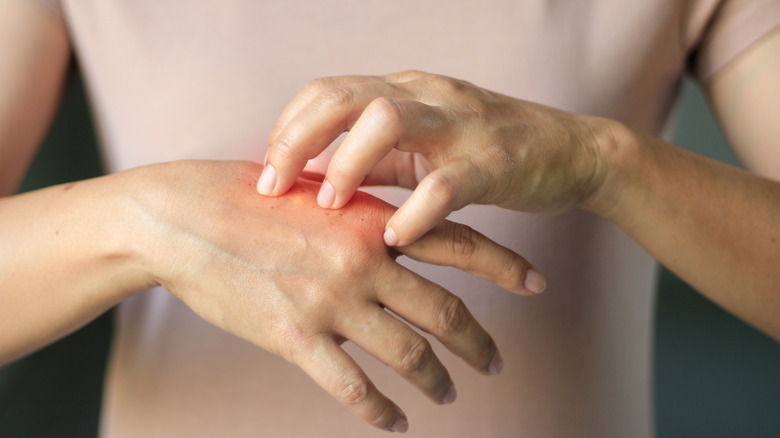What It Means When Your Skin Feels Hot To Touch
As a kid, if you ever thought you were coming down with a fever, a parent, teacher, or school nurse probably put their hand to your head to test whether or not your forehead felt hot to the touch. In doing so, the person is trying to determine whether or not your internal body temperature may be elevated beyond what it should be. While taking one's temperature with a thermometer is the only way to know for sure, skin that feels overheated on contact can potentially tell us a lot about our health.
First, it's important to note that skin that feels physically warm when touched may sometimes just be a result of circumstance. Did you just engage in a high-intensity workout? Have you been outside for hours in the hot summer sun? Are you wearing too many layers in a warm room? All of these can cause our skin to feel hotter than usual. One's skin may also feel warm if you've come in contact with an external irritant, such as detergent, latex, or products containing fragrance. Otherwise known as contact dermatitis, Healthline explains that the body's response to these irritants can include skin that's warm to the touch.
Potential health conditions related to skin that feels hot when touched
In some instances, skin that feels hot to the touch may simply be a natural part of aging. Such is the case for many women who experience hot flashes as they enter menopause. Although usually short in duration, the intense outbreaks of hot skin and sweating that characterize hot flashes start for many women around the age of 40, according to experts at Johns Hopkins Medicine.
Alternatively, hot skin can sometimes be indicative of a health condition. This may include illness from infection, including the flu, chickenpox, strep throat, pneumonia, or rheumatoid arthritis, among others (via Healthline). Although quite rare, flare-ups of pain, redness, and skin that is hot to the touch can all be signs of erythromelalgia, according to the National Health Service (NHS). Most often observed in the feet, erythromelalgia can sometimes impact other areas of the body. While the cause of the condition is not entirely understood, experts believe a genetic component may be at play.
Treatment and when medical care is needed
Not all cases of skin that feels hot upon contact will require professional medical treatment. For example, if you're feeling overheated from hot outdoor temperatures or in the aftermath of vigorous exercise, be sure to stay in the shade, remove excess clothing, and drink plenty of water.
For cases of hot skin related to mild contact dermatitis, over-the-counter (OTC) topical solutions like corticosteroids or antihistamines may prove helpful (via Healthline). In the event of illness or infection, such as the flu, chickenpox, strep throat, or any other health conditions related to hot skin, be sure to speak with your doctor in order to treat the underlying cause.
Generally speaking, a person who presents with skin that is hot to the touch should receive immediate emergency medical care if they experience additional symptoms (such as nausea, vomiting, headache, breathing difficulty, rapid pulse, chest pain, or seizures), are unconscious, or are experiencing a severe allergic reaction.



